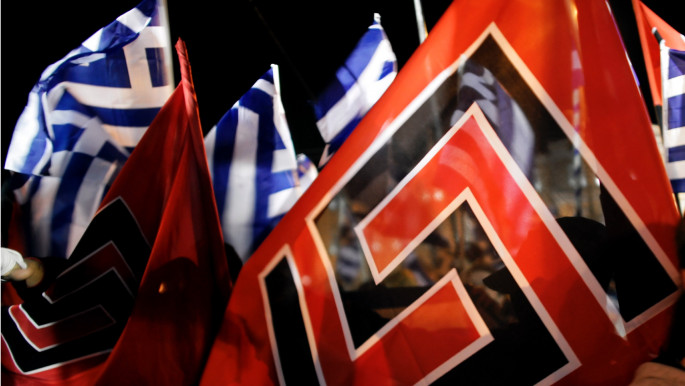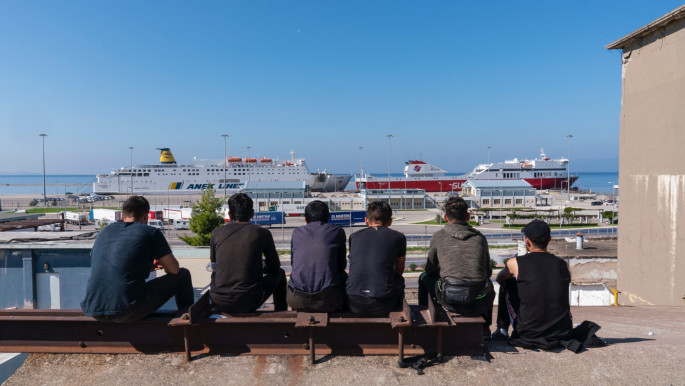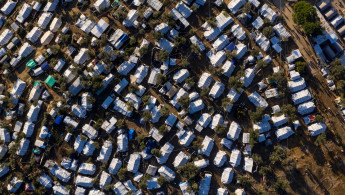How Greece is silencing NGOs to hide abuses at refugee camps
The law, passed on 30 November 2020, has been widely denounced as a cover-up measure for abuses refugees and asylum seekers suffer in reception facilities across the country.
It extends from social media to communications with any press and remains effective even after their period of work or volunteering ends. The clause is both broad and vague, and states that "in case of doubt all information regarding the camp should be considered as confidential".
It is more specific, however, when it comes to human rights abuses against refugees and incidences in which authorities have broken the law. In its final clause, it explicitly criminalises whistleblowing, stating no exemption from the gag order.
Instead of informing branches of government, civil society or the media, workers and volunteers must "inform the Commander of the centre".
Covering up abuses
Eva Iliadi worked for three years in a refugee camp in mainland Greece. "What we should focus on here is that it's a joke to say that they are doing this for the sake of protecting refugees' personal information," Iliadi tells The New Arab.
 |
The law has been widely denounced as a cover-up measure for abuses refugees and asylum seekers suffer in camps across the country |  |
Most major NGOs already employ highly restrictive confidentiality clauses on their workers, who must stay anonymous when leaking accounts of abuse and neglect to the press. The implementation of the confidentiality clause suggests an attempt by the government to further intimidate workers through a climate of fear from speaking out.
Greece's refugee camps have remained some of the most densely populated areas on the planet throughout the Covid-19 pandemic. Many lack sanitation facilities and basic shelter. For people fleeing war and persecution, the conditions can be retraumatising.
 |
|
| Read more: Moria camp tragedy is a wake-up call for Europe's failed migration policy |
"The government is using this law to deprive workers of our voices. With journalists barred from the camps, it's going to be us who will spread the word about what's going on inside - it's not going to be the ministers and the camp commanders," says Iliadi.
Maintaining a lie
Manos Moschopoulos works for Open Society, a European non-profit that seeks to educate citizens and encourage democratic debate and has been monitoring the treatment of refugees in Greece.
"The ruling party, New Democracy, was elected last year on a promise that it would eliminate refugee arrivals in Greece. As we all know, Greece's location makes this impossible; so this is a false promise, unless you're willing to break international law by illegally preventing people from seeking asylum," Moschopoulos tells The New Arab.
The law comes as part of a wider smear campaign against refugees and NGOs. Moschopoulos notes that after fires burnt Moria camp on Lesbos to the ground in September, media outlets reported being briefed by Ministry of Migration sources to suggest, without evidence, that NGOs had somehow set the fires.
 |
Even more groups could be shut out through this law - organisations that have been indispensable in supporting refugees and exposing deplorable conditions and human rights violations in the past |
 |
"Deflecting responsibility onto refugees and the groups working with them is a tactic for managing the frustration the governments' broken migration promise causes," says Moschopoulos.
Further restricting services
Choose Love is a movement-based fundraiser supporting grassroots solidarity work with refugees. They support a number of small NGOs and collectives who work in the Greek camps.
"By using this new confidentiality law as a tool to further exclude NGOs that critique and expose crimes, the Greek government will end up excluding those who also provide essential services and support," Advocacy Officer Nick van der Steenhoven tells The New Arab.
 |
|
| Read more: Golden Dawn: The fall of Greece's neo-Nazi party |
The support available to refugees in the camps is already skeletal. Volunteers from a free kitchen, the only reliable source of food for refugees in Malakasa camp near Athens, are among those whose ability to enter camps has recently been cast into doubt by ambiguous bureaucratic exclusions.
"Even more groups could be shut out through this law - organisations that have been indispensable in supporting refugees and exposing deplorable conditions and human rights violations in the past," says van der Steenhoven.
Unforeseen consequences for Greek democracy
Greek voters who found New Democracy's anti-refugee rhetoric compelling last summer may now find that the measures the ruling party is ushering in have undesired consequences for the rest of Greek society.
"My fellow Greeks must understand that this kind of crackdown on civil society is rarely something that remains limited to the rights of refugees," Moschopoulos says, noting that in nearby Hungary a recent roll back of civil liberties began by crushing the rights of refugees, migrants and those working to support them.
 |
My fellow Greeks must understand that this kind of crackdown on civil society is rarely something that remains limited to the rights of refugees |  |
Striking healthcare workers and university students have found their right to unionise and assemble limited, whilst press freedoms have slid to place Greece amongst the worst rated in Europe.
By criminalising whistle-blowing and empowering unaccountable bureaucrats to shrink civil society mobilisation, Greece is continuing down an anti-democratic slide from which turning back may prove difficult, Moschopoulos says.
 |
|
| Read more: The city where young migrants risk everything to escape Greece's immigration nightmare |
Ongoing resistance
Nonetheless, many refugee organisers and members of local solidarity groups have restated their will to continue to expose the human rights abuses in the camps.
Human rights activist and resident of Ritsona refugee camp, Parwana Amiri, argues that people must use alternative means of getting information out of the camps.
"The NGOs that are able to do activities don't have the right to talk or show what they see inside the camp," but "we are all free to act instead of them," she said on Twitter, adding that "solidarity is our strongest weapon".
Iliadi gave up her position working in a camp at the end of last year and continues her solidarity efforts in Athens. "If we allow the far-right elements to win this battle, they will turn the refugee camps into proper detention centres: no doctors, no teachers, no solidarity organisations, and this will have long lasting effects for all the people," Iliadi says.
"We need to show that teachers, doctors and refugees share the same interests, and counter the narratives that try to divide us."
Keira Dignan is a freelance journalist and librarian based in Athens, Greece
Follow her on Twitter: @DignanKeira



